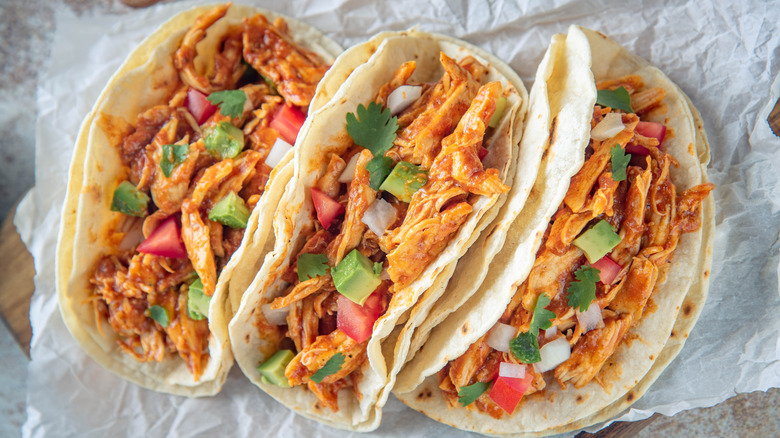Why You Should Avoid Eating Spicy Food On An Empty Stomach
Being the world's melting pot comes with the delicious advantage of having your pick of a wide variety of cuisines from around the world. As it turns out, eating spicy foods is popular in the United States, and may even be on the upswing. According to a recent survey from Tums, 46% of Americans love a good spicy taco, with 41% reporting that they love salsa. Buffalo hot wings and chili tied at 37%. But not all of those surveyed claimed to be able to tolerate the spice. While 44% described themselves as highly tolerant, 36% stated they avoided spicy foods.
Tolerance to spicy food will vary from person to person and there are those who will be more sensitive than others. For some, whether it's Mexican tacos, Indian curry, a classic Cajun gumbo, or Buffalo chicken wings, getting the runs whenever they eat spicy food is what keeps them running away from the hot stuff. Diarrhea and other kinds of discomforts that can result from eating spicy food are typically due to an ingredient called capsaicin, which is in the cayenne or chili pepper that often gives spicy foods their kick. The capsaicin activates a protein that works to protect our body from what is interpreted as harmful burning. As a result, the small intestine and colon will speed up the digestive process when you eat spicy food, causing some people to have to run to the bathroom (via Verywell Health).
Ways you can manage spicy food in your diet
While spices are known to potentially possess certain health benefits such as antioxidant properties, many spicy foods can contribute to stomach pain, especially spicy foods that are high in fat. When combined with alcohol, stomach issues are even more likely (via Livestrong). Discomforts such as diarrhea or an upset stomach will also likely increase if you eat spicy food on an empty stomach. "There's nothing else in there to mix with the spices and take the edge off when they come into contact with your stomach lining," says Lisa Ganjhu, M.D., a gastroenterologist at NYU Langone Medical Center (via Oprah).
If you're eating something spicy on an empty stomach, you can help stave off potential discomfort by integrating dairy such as milk or yogurt with your meal. According to Ganjhu, this is why yogurt is often served as an accompaniment with spicy Indian dishes.
Kenneth Brown, M.D, a board-certified gastroenterologist, told Verywell Health that another preventive measure you can take if you typically suffer after eating spicy foods is to eat a small amount of food that is sweet to help neutralize the spice. To reduce other symptoms caused by spicy food, such as acid reflux and nausea, try peppermint tea or ginger products such as tea, ginger ale and ginger bread. However, if you ever have stomach issues that worsen or persist over three hours after eating spicy food, consider seeking medical help (via Livestrong).


